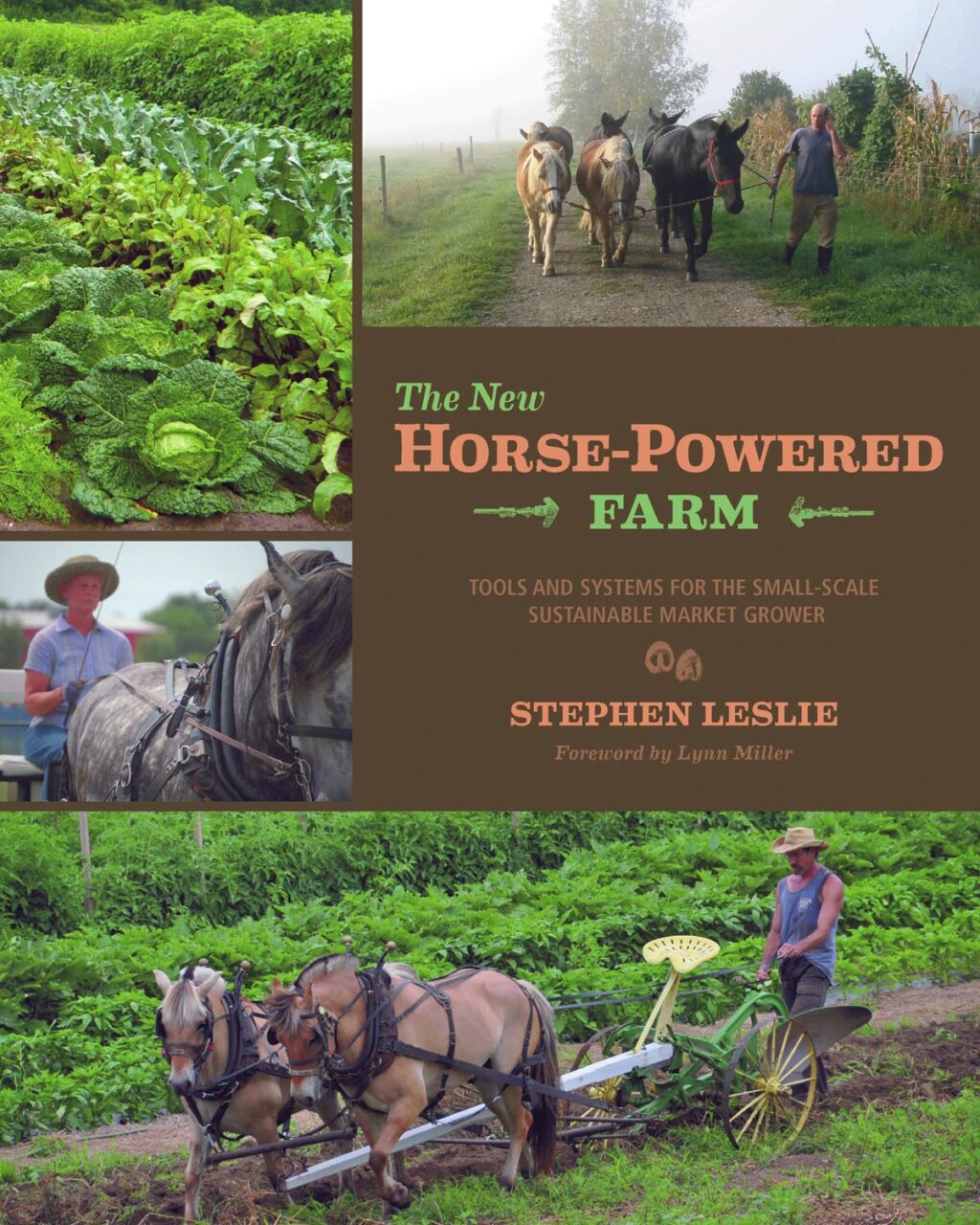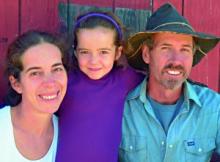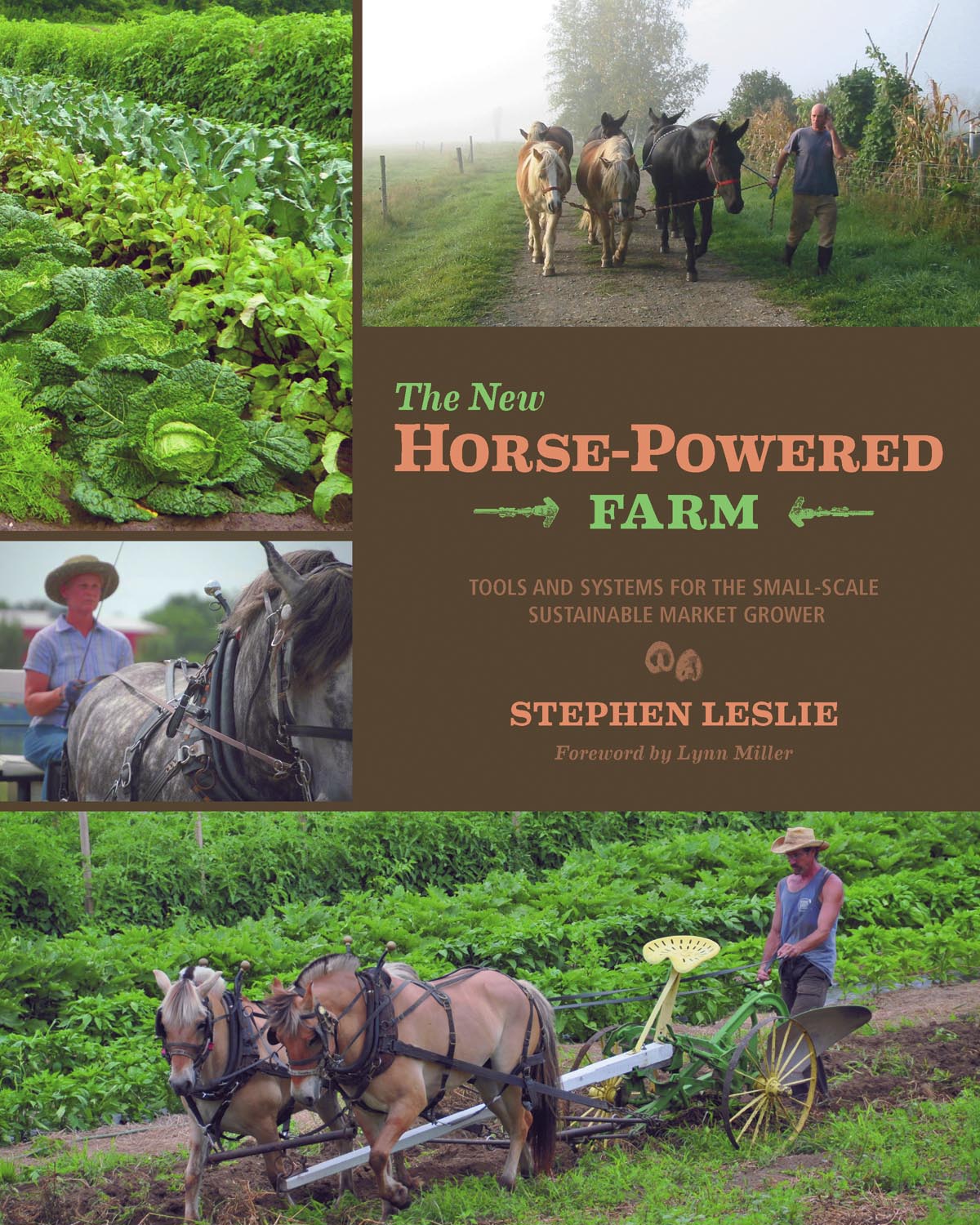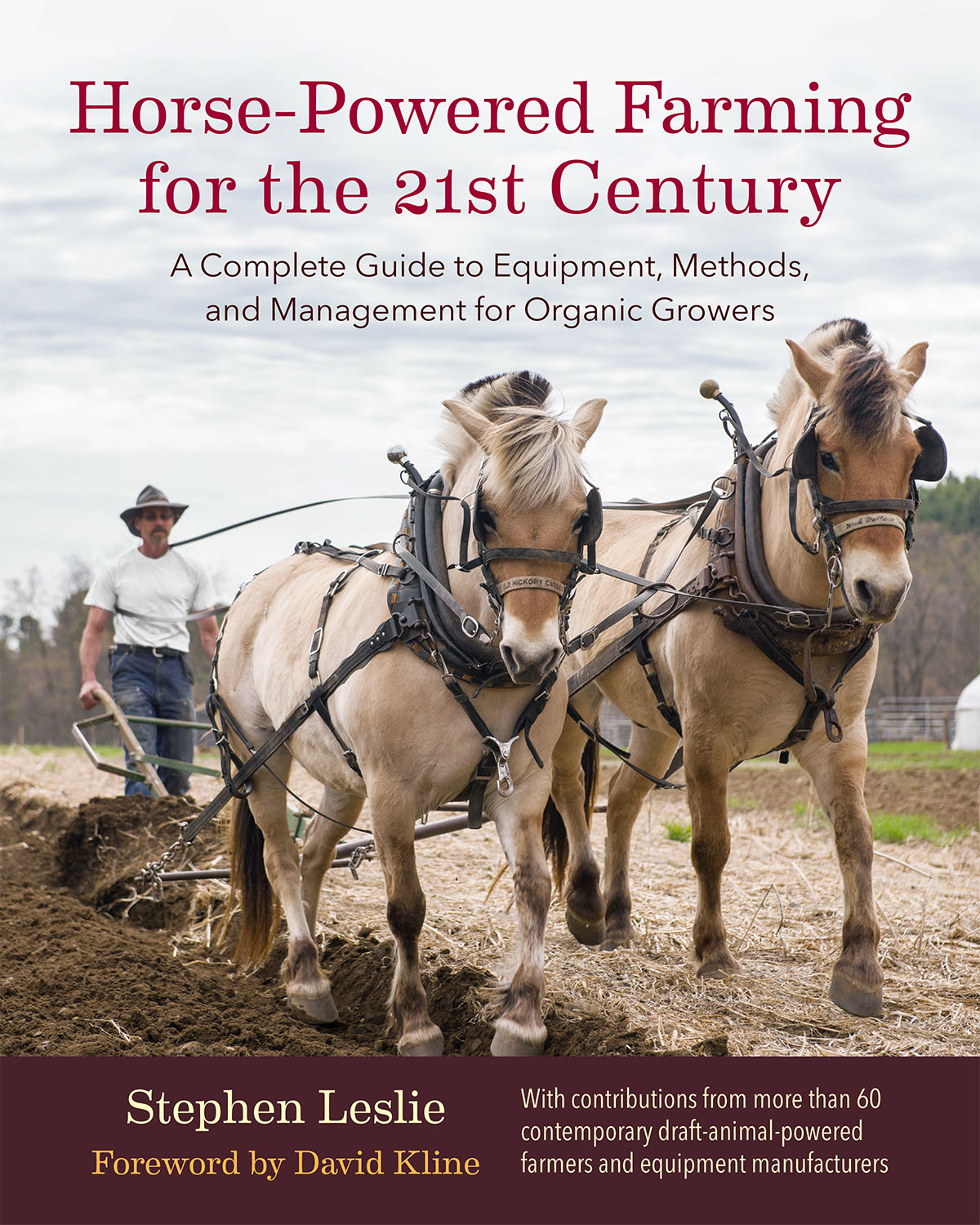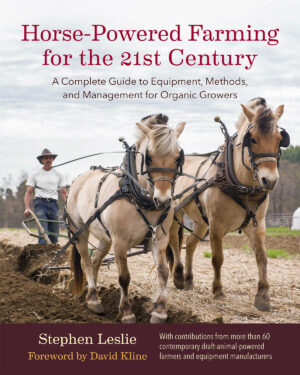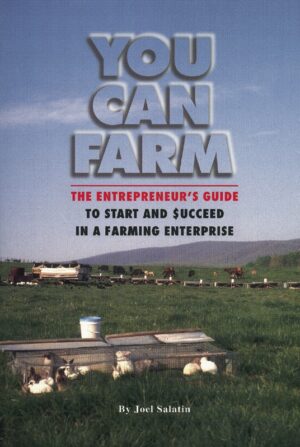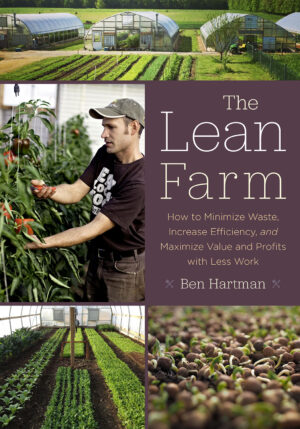The New Horse-Powered Farm
Tools and Systems for the Small-Scale, Sustainable Market Grower
| Pages: | 368 pages |
| Book Art: | Full-color illustrations throughout |
| Size: | 8 x 10 inch |
| Publisher: | Chelsea Green Publishing |
| Pub. Date: | March 5, 2013 |
| ISBN: | 9781603584166 |
The New Horse-Powered Farm
Tools and Systems for the Small-Scale, Sustainable Market Grower
In an era when fuel is a primary concern, draft horses are seen by many as the solution to small-scale, resilient farming with a closed-loop system. Horses bring farmers back to the roots of what it means to work the land and present a viable model for a small farm that lasts, while offering enjoyment for the whole family. This is the first book of its kind, offering wisdom and techniques for using horse power on the small farm or homestead, from longtime horse farmer Stephen Leslie.
The New Horse-Powered Farm sets the stage for incorporating draft power on the farm by presenting tips on getting started with horses, care of the work horse, different horse-training systems, and the merits of different draft breeds. The novice teamster is introduced to the basic tools of horse-drawn tillage and cultivation used for profitable horse-powered farming, with a spotlight on whole-farm management, as well as information on haying with horses, raising small grains, managing the woodlot, farm education, agritourism, and more.
Incorporated throughout are profiles of more than a half-dozen farms that epitomize some exciting new trends in agriculture and highlight the new and old horse-drawn equipment used for profitable market gardening, including contributions directly from the farmers about what works and what doesn’t. The novice teamster is introduced to the specifics of horse-drawn tillage and cultivation of the market garden, and using horses in the woodland. Recent studies on the economics of horse-powered market gardening and a comparison between horse-, human-, and tractor-powered systems have been included to help round out the picture. The resources section lists contact info for teamster schools, books, draft-animal publications, annual events, equipment manufacturers, parts and repairs, and more. A must-have for any farmer, homesteader, or teamster seeking to work with draft power in a closed-loop farming system.
Reviews and Praise
Publisher's Weekly-
"How many citizens of the 21st century know that a teamster is someone who drives workhorses? Leslie—a former art student and monk turned small-scale farmer—is part of a growing revival of horse-powered farming, and in this comprehensive, thoughtful guide, he dusts off archaic terms and demonstrates how he and others are reviving and revising traditional skills for a postmodern era of rising oil prices, soil loss and degradation, and climate change. The author covers horse selection and care; working and communicating with horses; training horses and drivers; old, repurposed, and newly created tools; and uses for horse labor on a small farm. Leslie also offers economic comparisons to tractor- and human-powered farms. Perhaps most importantly, he draws on stories from contemporary horse-powered farms to demonstrate both the satisfaction and difficulties of living in a work relationship with animals. 'The lively presence and wonderful mix of personalities the workhorses bring adds a richness of relationships that makes the farm without animals seem sterile and lonesome in comparison,' Leslie writes. This will be compelling reading for the enthusiastic and idealistic young farmers in the local food movement."
More Reviews and Praise
ForeWord Reviews-
"As homesteading and back-to-the-land movements gain momentum, many people are drawn to small-scale farming, where they feel more connected to the earth and its rhythms. Although there are plenty of cutting-edge tractors and implements available to them, sustainability-minded growers are gravitating toward more traditional methods for cultivation and farm maintenance, and often that means employing horses.
In his outstanding guide The New Horse-Powered Farm, Stephen Leslie covers a wide range of topics that will help many readers feel more comfortable about introducing horse labor into farming and gardening. With his comprehensive, crucial presentation of best practices, it’s likely that Leslie will serve as informal mentor to thousands more.
Leslie backs up his advice with extensive experience; he and his wife manage an organic farm in Vermont, and he previously served as an apprentice at a biodynamic farm in upstate New York. His book has its origins in a series of articles Leslie wrote for Small Farmer’s Journal about working with Fjord horses, which he expanded into a thorough, useful guide that will shepherd farmers through choosing a breed, basic horse care, training horses, making compost, and plow usage, among other topics.
Also well articulated are topics on growing, including use of plastic mulch, seeding cover crops, and planning vegetable fields according to horse-powered harvest methods. Throughout, Leslie includes numerous photos that illustrate his main points and some of the horse breeds and harness systems that vary from farm to farm.
In addition to handy sidebars with plenty of tips, Leslie includes commentary from other farm owners, making the book into a rich compendium of opinion and advice.
Fascinating and exceptionally well written, The New Horse-Powered Farm is a major work that deserves to be on the shelf of every small-scale market grower, whether they use horses or not.
Although he covers an variety of technical information—right down to thoughts about the tongue length for implements pulled by draft ponies—Leslie writes in an accessible style that’s understandable to the layman. When he veers slightly into the realm of sustainability issues like water retention and soil conservation, he introduces an idealistic tone without sounding dire or political. He simply believes in what he’s doing, and conveys his beliefs with passion and commitment."
Library Journal-
"Readers will quickly find this work, far from a nostalgic look at using horses to farm, to be an excellent, practical guide to incorporating horses into sustainable farming practices. Leslie has used draft horses to farm and garden for several years and currently manages an organic farm at the Cobb Hill Ecovillage in Hartland, Vermont. In this comprehensive work, the author successfully covers the selection of draft breeds (from minis to full size) based on the amount and kinds of work to be accomplished, types of harnesses and hitches (single and multi-horse), advances in horse-powered equipment, best practices for creating fertile soils and working the land for a variety of crops, necessary training for both humans and horses, the economics aspects, and other uses of horses on the farm. The book includes numerous stories of how horses have been incorporated into a variety of production systems by farmers other than the author, further demonstrating the variety of ways in which human, horse, and tractor systems can be combined to create more sustainable farming systems. VERDICT This book is highly recommended for both public and academic libraries, particularly those in rural settings."
"I applaud Stephen Leslie’s important new book, a volume that combines information about good farming and working with animals. This volume moves animal power forward yet another step."--Lynn Miller, from the Foreword
"Many equate draft horse-powered farming with tilting at windmills, a laudable but unrealistic ambition. In this book, however, Stephen Leslie demonstrates that draft horse power is ideally suited to vegetable market farming. Indeed, this comprehensive treatment of the subject provides the beginner or transitional farmer with the resources needed to succeed, as Leslie takes no shortcuts in his research and presentation of material."--Joe Mischka, editor & publisher, Rural Heritage Magazine
“The New Horse-Powered Farm is a thorough and practical book for anyone considering horse-powered farming. Stephen Leslie knows and understands what he writes about because he walks the talk. This is an extraordinarily comprehensive guide for anyone interested in horse-powered farming, and clearly shows how to get started, from the selection and care of the different horse breeds, training the horse and the teamster, soil fertility, plowing, tillage, seeding, and harvesting, to managing pastures and making hay. As a lifelong horse-powered farmer, I learned a lot from reading this book.”--David Kline, founding publisher of Farming Magazine
Reviews and Praise
Publisher's Weekly-
"How many citizens of the 21st century know that a teamster is someone who drives workhorses? Leslie—a former art student and monk turned small-scale farmer—is part of a growing revival of horse-powered farming, and in this comprehensive, thoughtful guide, he dusts off archaic terms and demonstrates how he and others are reviving and revising traditional skills for a postmodern era of rising oil prices, soil loss and degradation, and climate change. The author covers horse selection and care; working and communicating with horses; training horses and drivers; old, repurposed, and newly created tools; and uses for horse labor on a small farm. Leslie also offers economic comparisons to tractor- and human-powered farms. Perhaps most importantly, he draws on stories from contemporary horse-powered farms to demonstrate both the satisfaction and difficulties of living in a work relationship with animals. 'The lively presence and wonderful mix of personalities the workhorses bring adds a richness of relationships that makes the farm without animals seem sterile and lonesome in comparison,' Leslie writes. This will be compelling reading for the enthusiastic and idealistic young farmers in the local food movement."
ForeWord Reviews-
"As homesteading and back-to-the-land movements gain momentum, many people are drawn to small-scale farming, where they feel more connected to the earth and its rhythms. Although there are plenty of cutting-edge tractors and implements available to them, sustainability-minded growers are gravitating toward more traditional methods for cultivation and farm maintenance, and often that means employing horses.
In his outstanding guide The New Horse-Powered Farm, Stephen Leslie covers a wide range of topics that will help many readers feel more comfortable about introducing horse labor into farming and gardening. With his comprehensive, crucial presentation of best practices, it’s likely that Leslie will serve as informal mentor to thousands more.
Leslie backs up his advice with extensive experience; he and his wife manage an organic farm in Vermont, and he previously served as an apprentice at a biodynamic farm in upstate New York. His book has its origins in a series of articles Leslie wrote for Small Farmer’s Journal about working with Fjord horses, which he expanded into a thorough, useful guide that will shepherd farmers through choosing a breed, basic horse care, training horses, making compost, and plow usage, among other topics.
Also well articulated are topics on growing, including use of plastic mulch, seeding cover crops, and planning vegetable fields according to horse-powered harvest methods. Throughout, Leslie includes numerous photos that illustrate his main points and some of the horse breeds and harness systems that vary from farm to farm.
In addition to handy sidebars with plenty of tips, Leslie includes commentary from other farm owners, making the book into a rich compendium of opinion and advice.
Fascinating and exceptionally well written, The New Horse-Powered Farm is a major work that deserves to be on the shelf of every small-scale market grower, whether they use horses or not.
Although he covers an variety of technical information—right down to thoughts about the tongue length for implements pulled by draft ponies—Leslie writes in an accessible style that’s understandable to the layman. When he veers slightly into the realm of sustainability issues like water retention and soil conservation, he introduces an idealistic tone without sounding dire or political. He simply believes in what he’s doing, and conveys his beliefs with passion and commitment."
Library Journal-
"Readers will quickly find this work, far from a nostalgic look at using horses to farm, to be an excellent, practical guide to incorporating horses into sustainable farming practices. Leslie has used draft horses to farm and garden for several years and currently manages an organic farm at the Cobb Hill Ecovillage in Hartland, Vermont. In this comprehensive work, the author successfully covers the selection of draft breeds (from minis to full size) based on the amount and kinds of work to be accomplished, types of harnesses and hitches (single and multi-horse), advances in horse-powered equipment, best practices for creating fertile soils and working the land for a variety of crops, necessary training for both humans and horses, the economics aspects, and other uses of horses on the farm. The book includes numerous stories of how horses have been incorporated into a variety of production systems by farmers other than the author, further demonstrating the variety of ways in which human, horse, and tractor systems can be combined to create more sustainable farming systems. VERDICT This book is highly recommended for both public and academic libraries, particularly those in rural settings."
"I applaud Stephen Leslie’s important new book, a volume that combines information about good farming and working with animals. This volume moves animal power forward yet another step."--Lynn Miller, from the Foreword
"Many equate draft horse-powered farming with tilting at windmills, a laudable but unrealistic ambition. In this book, however, Stephen Leslie demonstrates that draft horse power is ideally suited to vegetable market farming. Indeed, this comprehensive treatment of the subject provides the beginner or transitional farmer with the resources needed to succeed, as Leslie takes no shortcuts in his research and presentation of material."--Joe Mischka, editor & publisher, Rural Heritage Magazine
“The New Horse-Powered Farm is a thorough and practical book for anyone considering horse-powered farming. Stephen Leslie knows and understands what he writes about because he walks the talk. This is an extraordinarily comprehensive guide for anyone interested in horse-powered farming, and clearly shows how to get started, from the selection and care of the different horse breeds, training the horse and the teamster, soil fertility, plowing, tillage, seeding, and harvesting, to managing pastures and making hay. As a lifelong horse-powered farmer, I learned a lot from reading this book.”--David Kline, founding publisher of Farming Magazine

